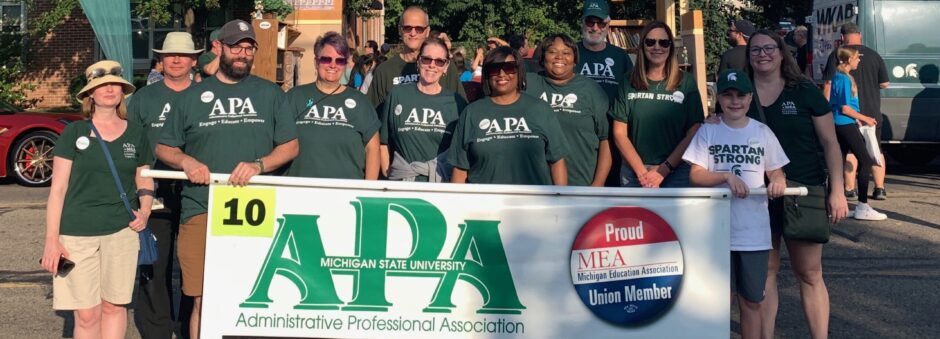Bargaining Summary: How it Works Between APA and MSU
The contract bargaining process is different for all unions. It is based on the working relationship between the University and the elected representatives of each union. The proper functions depend on mutual respect. Each side arrives at the bargaining table with al list of their initial goals. There is a mutual understanding that both sides have a point where they are comfortable with the final agreement, to ensure successful bargaining. The bargaining environment can be intense, direct, and passionate, while hopefully remaining respectful and professional. Every effort is directed to getting the best agreement possible. Not every issue is resolved in this round of bargaining. If they are not resolved, they are not lost but retained for the next bargaining cycle.
There are many steps leading up to a normal process for bargaining a successor agreement.
- There is a call out for members to apply for involvement in the APA Negotiations Committee.
- From that pool of respondents, we select members of the Negotiation Committee
- The selections are based on getting the widest perspective of the membership.
- The Negotiations Committee has a number of duties some of which include:
- Surveying membership for issues and concerns
- Summarizing those issues and concerns into a priority list for the Bargaining Team
- Being available to support the Bargaining team should any actions be required. This allows the Bargaining Team the ability to maintain focus on the bargaining discussions.
- From the Negotiating Committee, the APA Chairperson selects a Bargaining Team of nine. That list is brought to the APA Executive Board, for their concurrence. That team is selected using several factors to get the most-broad perspective and expertise.
- The Bargaining Team is then brought together to start building strategies using the priority list from the Negotiations Committee. This can also include other items identified from the previous contract and grievances.
- A couple of months prior to the expiration of the contract, we contact the University to arrange dates for bargaining to begin. These bargaining days can be partial or full days with some becoming long nights as the contract expiration approaches.
- Bargaining sessions consist of each side exchanging proposal back and forth, countering the other’s previous proposal.
- During the process, each side is bound by the rules of bargaining in good faith which means they cannot share details of the discussion away from the bargaining table. We are very careful to comply with these rules since a violation can harm our bargaining position. In addition, sharing any part of our strategy during the bargaining process only provides the University inside knowledge and hinders our potential gains.
- Eventually proposals are either dropped, modified, and/or agreed upon as individual items. In the end, when the last individual item is settled, all of them are collected into a Tentative Agreement (TA). Getting a Tentative Agreement is not the end. The Tentative Agreement is then brought to the membership (dues paying members only) for a ratification vote.
- If that ratification vote approves the Tentative Agreement by a simple majority of those voting, we have a new contract in place.
- If that ratification vote does not approve the Tentative Agreement, we reach out to our membership to understand what parts are unacceptable and either work with members or return to the bargaining table to continue work on the agreement, until another TA can be produced.
- Sometimes an agreement cannot be reached. There are a number of options available, such as calling in a Michigan Employment Relations Commission (MERC) mediator. This party’s findings are not binding but they do work to get the negotiations back on a more productive path.
- There are times when the negotiating environment is contentious and non-productive. This is when unions use all their resources to apply pressure supporting their positions.
Our previous APA Collective Bargaining Agreement (CBA) expired at midnight September 30, 2023. This is the first time in decades that a successor agreement was not reached before the expiration. The APA was able to secure an extension of the current agreement until midnight of October 31, 2023. The process has been very involved as the labor environment undergoes many changes. We are partnered with the MEA and using all available resources to help get this contract settled.
As an APA member, your engagement is critical. If the negotiations drag on, we may be calling on each and every member to become more engaged. A strong collective voice is the core of what it means to be part of a union. When we are at the bargaining table and can say “Our members are saying …” it has power. It is only the voices of dues paying members that are heard. If someone is not a member, this is the time to become a member. Sitting on the sidelines, saying “I can get the same thing for free” only undermines success for everyone. They cannot expect their friends to continue to provide them free benefits. There is no better time to join than now. There is no better cause than this.
We have a new bargaining slogan you will be seeing soon.
Respect • Invest • Retain
MSU cannot continue to grow without your skills. You deserve respect. Your skills are an investment. And the university can’t lead if they don’t retain your talents.
In solidarity
Martin
